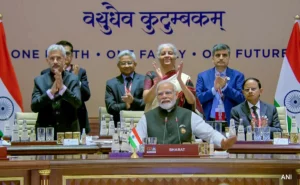The G20 Summit in New Delhi gave a thumbs up to Prime Minister Narendra Modi’s vision of India’s Presidency–We are One Earth, One Family, and We share One Future.

To that effect, the leaders of the G20 nations have committed to bridging existing digital divides and accelerating progress for inclusive and sustainable development.
Here’s how they plan to go about it.
Building and sustaining DPIs or Digital Public Infrastructures
Leaders of G20, under India’s Presidency, have committed to play their parts and bring forth DPI or Digital Public Infrastructure.
DPI is a constantly developing idea, but it refers to a collection of digital systems that both the government and private businesses use. These systems are secure and robust and can be created using open standards and open-source software. DPI has the potential to provide large-scale services to society.
DPIs must be secure, trusted, accountable, and inclusive while respecting human rights, personal data, privacy, and intellectual property rights to foster resilience.
For that, the leaders will adopt the G20 Framework for Systems of Digital Public Infrastructure, a voluntary framework for the development, deployment, and governance of DPI. The leaders also committed to welcome India’s plan to build and maintain a global
repository or GDPIR, a virtual repository of DPI, which the world will share.
The leaders will also consider the Indian Presidency’s proposal for One Future Alliance (OFA), an initiative to build capacity and provide technical assistance and adequate funding for implementing DPI in developing countries.
Building a safe and resilient Digital Economy
The leaders acknowledged that fostering an inclusive, transparent, equitable, and secure digital economy cannot be overstated in today’s rapidly evolving digital landscape. This holds for all nations and stakeholders, provided it aligns with the relevant legal frameworks.
Therefore, the leaders committed to sharing strategies and best practices to establish a digital economy that is not only safe and secure but also resilient.
To achieve this, the leaders have endorsed the non-binding G20 High-level Principles designed to assist businesses in fortifying safety, security, resilience, and trust within the digital economy. They also welcomed the idea of a G20 Toolkit focused on enhancing cyber education and awareness among children and youth, recognizing its significance in nurturing a digitally savvy generation.
Fostering Digital Ecosystems
The Leaders of G20 declared to use all available digital tools and technologies to create secure and resilient digital environments. This should ensure that every person on Earth has access to financial services.
To achieve this, member nations will encourage responsible and sustainable use of digital technology among farmers and support Agri-Tech start-ups and small businesses. They will also establish the Global Initiative on Digital Health (GIDH) under the supervision of the World Health Organisation. And finally, they will use digital technologies to safeguard and promote culture and cultural heritage.









